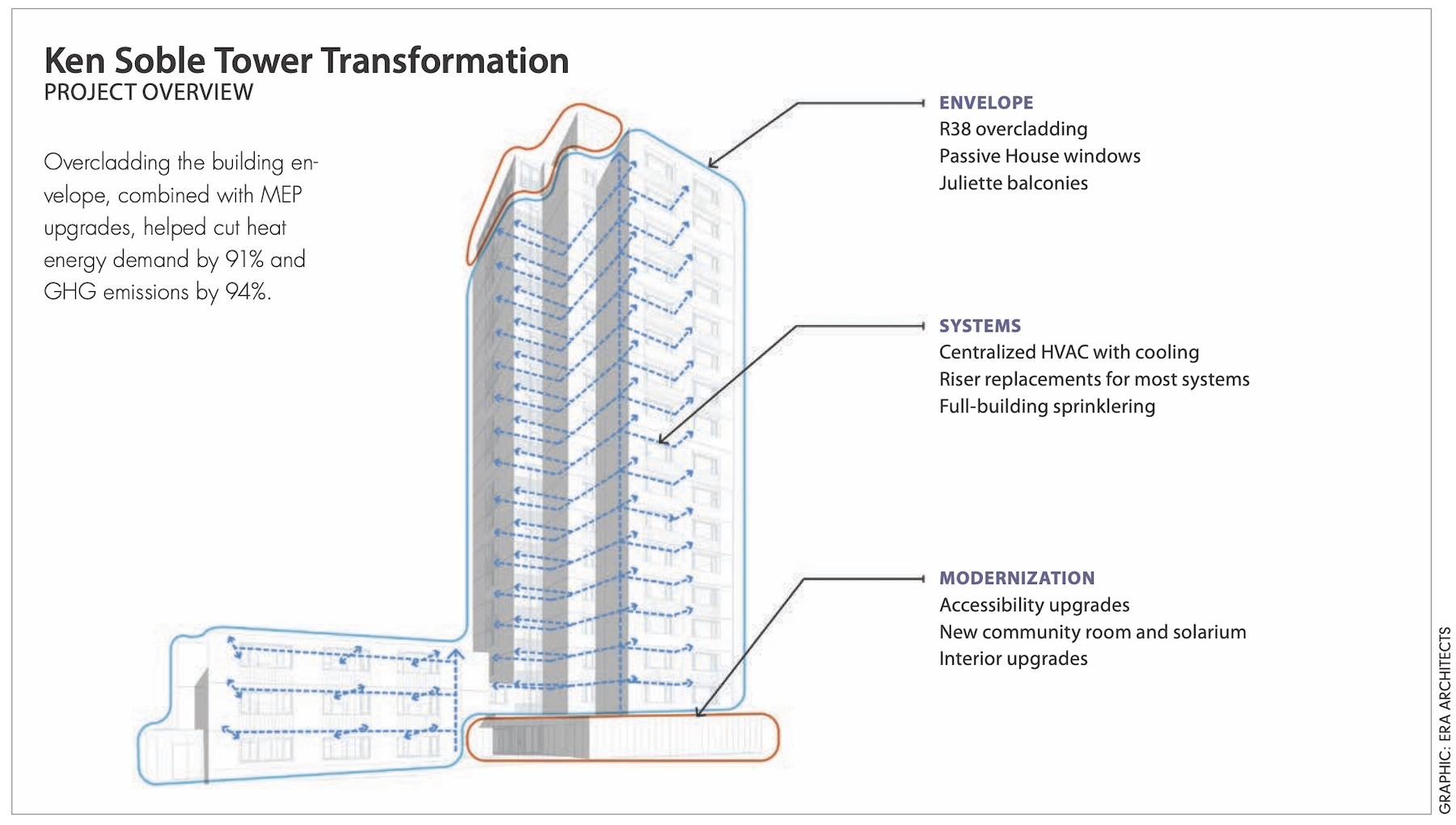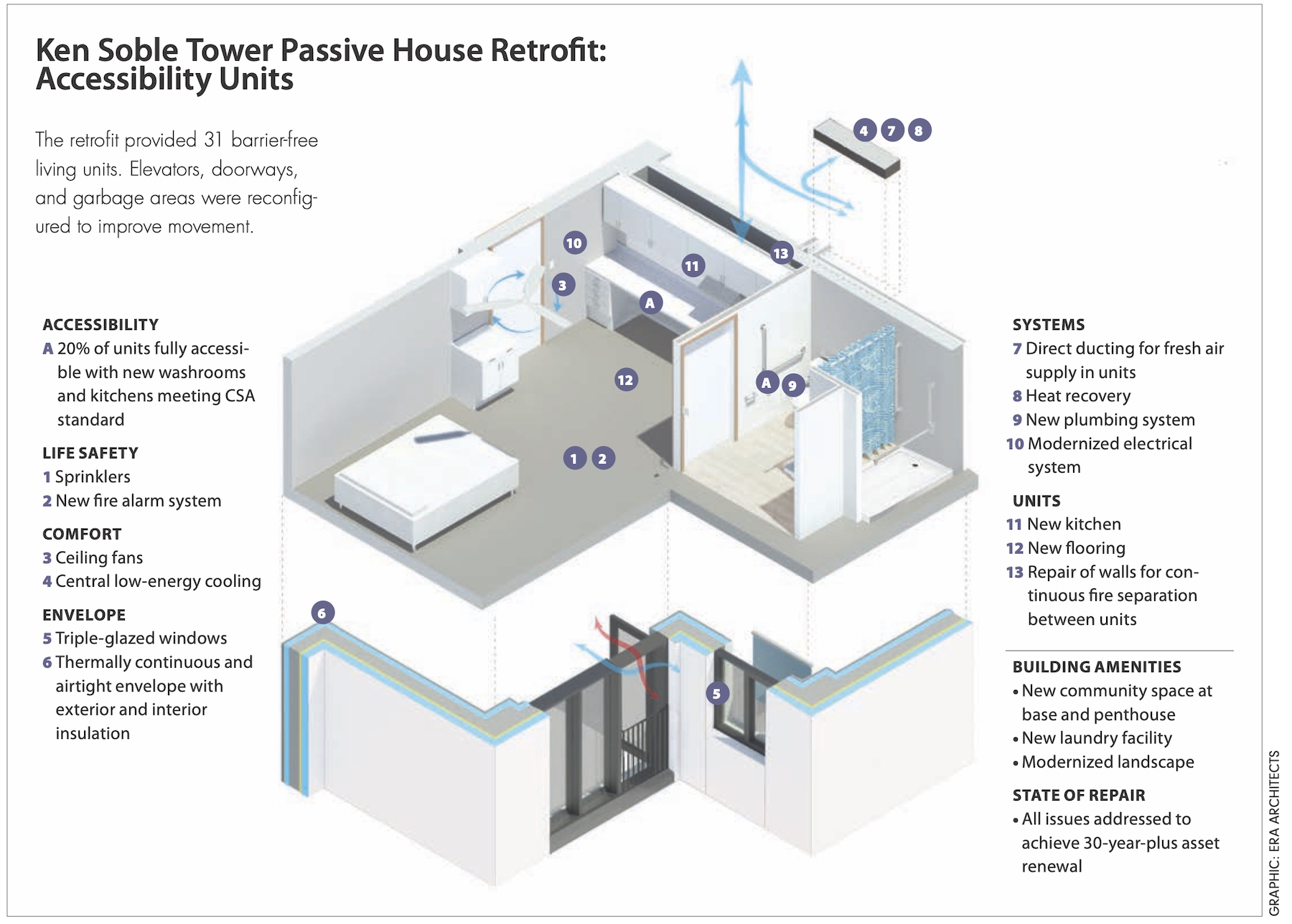Ken Soble Tower, an affordable housing high-rise for seniors in Hamilton, Ont., is now arguably the world’s largest residential building retrofitted to the Passive House standard.
Led by ERA Architects and PCL Construction, the project team slashed the 80,000-sf, 18-story building’s greenhouse gas emissions by 94% and its heating energy demand by 91% en route to achieving EnerPHit certification. The total energy needed to heat and cool one of its 146 units is now equivalent to that needed to power three 100-watt light bulbs.
Built in 1967 as part of the “North End Renewal” of West Harbour, an industrial neighborhood on Lake Ontario, the tower and an accompanying three-story walkup provided one-bedroom and bachelor apartments for families and single workingmen.
At the time, the complex, named after the founder of a local radio station and a local TV station, was considered a showcase property in the portfolio of CityHousing Hamilton, the municipal housing authority.
By 2012, however, the property was showing its age. The elevators constantly failed; so, too, the heating and cooling system. Mold, peeling paint, and water damage were apparent everywhere.
Worst of all: the pest problem. Forty-two percent of maintenance calls were for cockroaches, rodents, and bedbugs. The bedbug infestation was so bad the housing agency had to move whole floors of tenants to temporary housing on the 16th floor while crews tried to kill the critters. The bedbugs kept coming back.
The housing agency started relocating tenants. In less than four years, two-thirds of the apartments in Ken Soble Tower were vacant, despite a citywide waitlist of 6,000 families seeking affordable housing.

In 2015, CityHousing Hamilton, which manages 7,000 apartments in 1,265 properties, for 13,000 residents, surveyed the tower’s remaining residents about the future of the property; 83% responded. Their message to the agency: “Keep Ken Soble Tower.” A year later, the financial consulting firm Deloitte, acting on behalf of CityHousing Hamilton, studied the options—sell, demolish and rebuild, perform basic capital repairs, or refurbish—and came to the same conclusion: renovate.
The housing agency gave the go-ahead to completely retrofit Ken Soble Tower, a project that became part of Canada’s National Housing Strategy to modernize and decarbonize older affordable apartments. The project was folded into the Tower Renewal Partnership, an initiative by the nonprofit Centre for Urban Growth and Renewal (cugr.ca) to transform Southern Ontario’s stock of post-war apartment towers into more healthy, resilient, and complete communities.
A FIVE-PRONGED APPROACH TO RESTORATION
The renewal effort had five objectives:
- Modernize all 146 dwelling units.
- Attain EnerPHit certification, based on 2050 temperature projections, to cut GHG emissions by 94% and energy intensity by 70%.
- Allow for aging-in-place, by creating 31 barrier-free residences and reconfiguring elevators, doorways, and residential garbage areas to allow for barrier-free movement throughout the building.
- Address the housing authority’s 30-year capital repair program.
- Maintain “deep affordability,” through Hamilton’s Rent Geared to Income subsidy.
The building envelope consisted of composite masonry walls with minimal interior insulation and vapor control layers; it was sorely deteriorated. The design team’s first thought was to build an entire wall assembly outside the brick. Instead, the team overcladded the structure: first, with a liquid-applied air barrier; followed by a DuROCK PUCCS NC noncombustible rainscreen EIFS system, which incorporated 50,000 sf of a six-inch-thick layer of Rockwool stone wool insulation into the façade; finally, a stucco finish. Another four inches of mineral wool was added to the interior.
The EIFS system helped the project realize the R-38 effectiveness required to achieve EnerPHit certification. The retrofit resulted in a 94% reduction in GHG emissions and a 91% cut in heating energy demand. In practical terms, it meant that the building would stay warm in winter for up to two days and below dangerous heat levels in summer for up to four days.
Concrete slab balconies were replaced with juliettes to meet maintenance and accessibility requirements and eliminate thermal bridging. Easily operable triple-glazed windows and doors were installed to encourage natural ventilation. The roof membranes and below-grade waterproofing were replaced with fluid-applied products and upgraded with up to 16 inches of insulation.
Mechanical systems were completely overhauled with new central systems that provide tempered fresh air to each suite from rooftop energy recovery ventilators (ERVs), and individual control with in-suite variable-air volume (VAV) dampers with reheat. Common areas are served by smaller ERVs that are activated by occupancy sensors. A sophisticated building automation system will measure and verify that all building systems are functioning as designed.
The project came in at $34 million ($233,000/unit), 70% of which was for base building renewal, 30% for low-energy initiatives.
COMPREHENSIVE AIR TIGHTNESS TESTING
To achieve EnerPHit certification from Passive House Canada, the team developed a comprehensive air tightness testing and quality management program, led by PCL’s in-house building envelope engineering and construction team. Final operational whole building air tightness tests came in at 0.235 air changes/hr at 50 pa, beating the target by more than 50%.
One novel effort was that all building trades’ foremen and supervisors participated in a Passive House trades training session, with a focus on airtightness and reducing thermal bridging.

“Social sustainability” also played a part in the retrofit program. A dingy laundry room on the 18th floor was turned into a solarium, with views of the harbor. High-contrast wayfinding and bright color palettes were added to support community cohesion. Higher delivery of fresh air directly to units and the selection of low-VOC interior finishes greatly improved indoor air quality.
Adding to its distinctions, the Ken Soble Tower will become a teaching laboratory. CityHousing Hamilton, the University of Toronto, ERA Architects, and PCL Construction will, over the next two years, measure the impacts of the building on its residents and the surrounding environment, including building performance, occupant health and safety, and economic benefit.
PROJECT TEAM | KEN SOBLE TOWER
Owner: CityHousing Hamilton
Lead Architect/Interiors/Landscape Design: ERA Architects
Structural Engineer/Building Envelope Consultant: Entuitive
Mechanical Engineer: Reinbold Engineering Group
Electrical Engineer: Nemetz (S/A) & Associates
Passive House Consultants: JMV Consulting; Transsolar
Passive House Certifier: Herz & Lang GmbH
Building Envelope Testing: Engineering Link
Commissioning Consultant: CFMS Consulting Inc.
Elevators: Soberman Engineering
Building Code Consultant: LMDG Security/Telecoms Zerobit
Construction Consultant: SCR Consulting
Construction Manager: PCL Construction
Related Stories
| Aug 11, 2010
National Intrepid Center of Excellence tops out at Walter Reed
SmithGroup and The Intrepid Fallen Heroes Fund (IFHF), a non-profit organization supporting the men and women of the United States Armed Forces and their families, celebrated the overall structural completion of the National Intrepid Center of Excellence (NICoE), an advanced facility dedicated to research, diagnosis and treatment of military personnel and veterans suffering from traumatic brain injury.
| Aug 11, 2010
USGBC honors Brad Pitt's Make It Right New Orleans as the ‘largest and greenest single-family community in the world’
U.S. Green Building Council President, CEO and Founding Chair Rick Fedrizzi today declared that the neighborhood being built by Make It Right New Orleans, the post-Katrina housing initiative launched by actor Brad Pitt, is the “largest and greenest community of single-family homes in the world” at the annual Clinton Global Initiative meeting in New York.
| Aug 11, 2010
Trump luxury condos in Jersey City get more luxurious
Only two years after opening, Jersey City-based Trump Plaza Residences is getting a facelift. Interior designer Benjamin Noriega-Ortiz of BNOdesign has been commissioned to create a fresh design for the residential tower's entrance and outdoor pool, cabana, and lawn spaces. Renovations on the 55-story, 443-unit luxury high-rise will be completed in two phases.
| Aug 11, 2010
Apartments offer skyline view of Houston
Perched atop a hill near downtown Houston, the Gables Memorial Hills residential tower will rise to eight stories and cover 2.68 acres. With an average unit size of 965 sf, the brick and cast-stone complex will consist of 70% one-bedroom units and 30% two-bedroom units, some of which overlook downtown.
| Aug 11, 2010
Sustainable features central to independent-living building
Architecture firm Perkins Eastman, together with Saint Johns on the Lake retirement community, plans to open a 21-story, 88-unit independent-living building for seniors by mid 2011. When the $46-million project is complete, it will offer residents a streetside café, art gallery, spa and wellness center, classroom, and community performance space.
| Aug 11, 2010
Historic building to be restored in Kansas City
Construction has begun on the conversion of the historic 17-story Home Savings Association building in Kansas City, Mo. The transformed structure, to be known as Grand Boulevard Lofts, will house 134 apartment units. The $18-million project, designed by architect Rosemann & Associates, follows a revitalization of downtown Kansas City, where there is high demand for affordable housing to ser...
| Aug 11, 2010
Old factory converted from hearth to home
A former briquette factory in Cologne-Frechen, Germany, was converted into a mixed-use building by Astoc Architects & Planners, Cologne, in association with Rheinischen Amt für Denkmalpflege—the Rhenish agency for historic preservation. The roughly 172,200-sf building includes a mix of residential condominiums, lofts, and leased commercial space.
| Aug 11, 2010
And the world's tallest building is…
At more than 2,600 feet high, the Burj Dubai (right) can still lay claim to the title of world's tallest building—although like all other super-tall buildings, its exact height will have to be recalculated now that the Council on Tall Buildings and Urban Habitat (CTBUH) announced a change to its height criteria.
| Aug 11, 2010
Luxury high-rise meets major milestone
A topping off ceremony was held in late October for 400 Fifth Avenue, a 57,000-sf high-rise that includes a 214-room luxury hotel and 190 high-end residential condominiums. Developed by Bizzi & Partners Development and designed by Gwathmey Siegel & Associates Architects, the 60-story tower in midtown Manhattan sits atop a smaller-scale 10-story base, which creates a street façade t...
| Aug 11, 2010
Mixed-use Seattle high-rise earns LEED Gold
Seattle’s 2201 Westlake development became the city’s first mixed-use and high-rise residential project to earn LEED Gold. Located in Seattle’s South Lake Union neighborhood, the newly completed 450,000-sf complex includes 300,000 sf of Class A office space, 135 luxury condominiums (known as Enso), and 25,000 sf of retail space.






